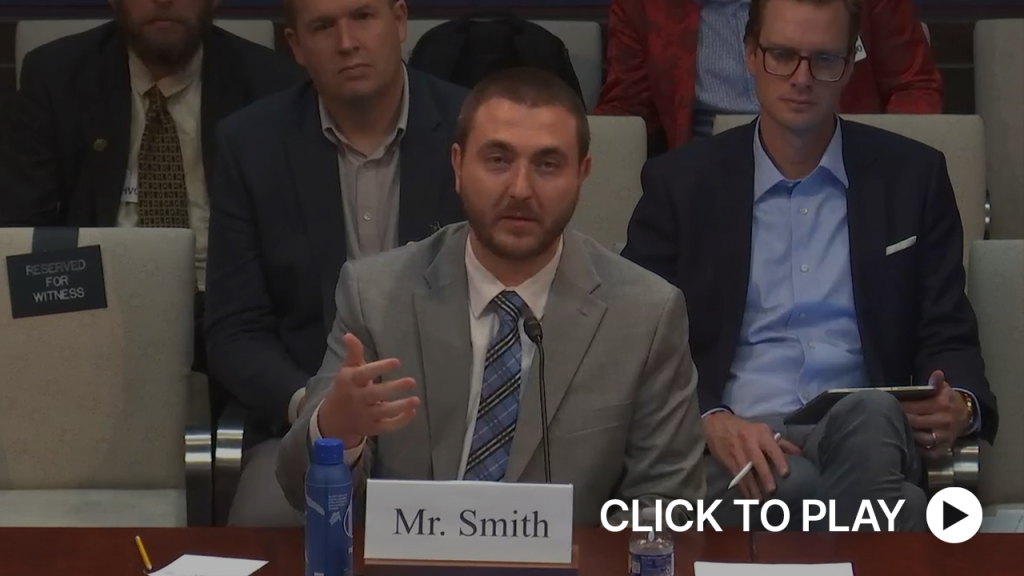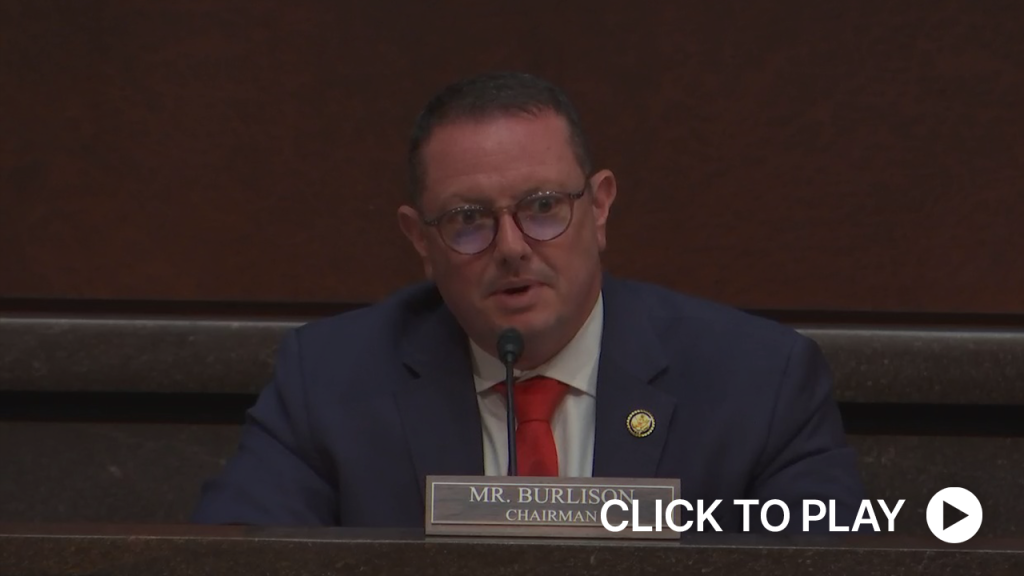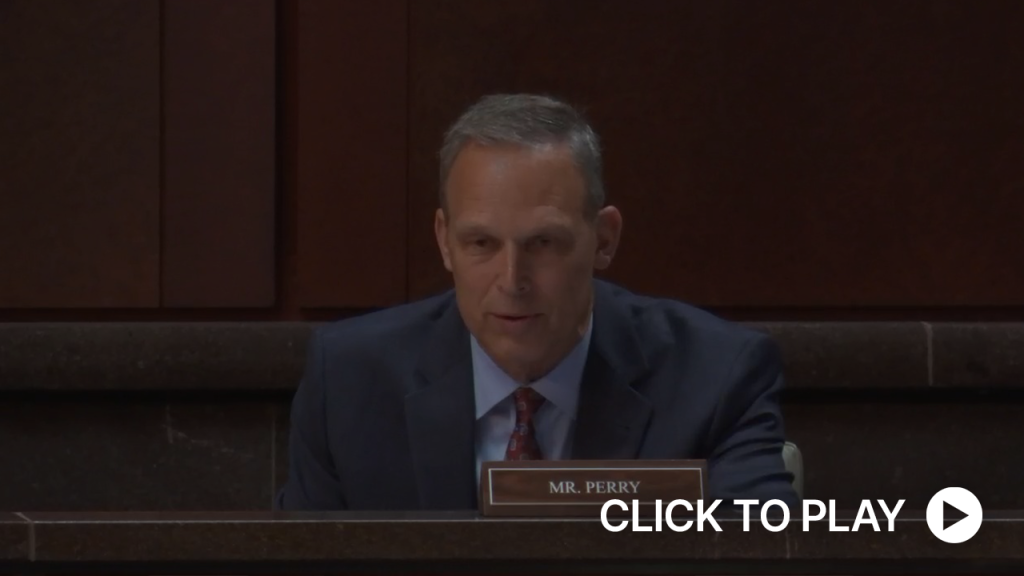
Hearing Wrap Up: Congress Must Act to Advance Nuclear Energy
WASHINGTON—The Subcommittee on Economic Growth, Energy Policy, and Regulatory Affairs held a hearing yesterday titled “The New Atomic Age: Advancing America’s Energy Future.” During the hearing, members heard from witnesses about the advent of small and micro modular nuclear reactors and how their development and deployment will advance the use of safe, clean and reliable nuclear energy in the United States. Members emphasized the importance of expanding nuclear energy because of its efficiency and low cost compared to other energy sources.
Key Takeaways:
Small and micro modular reactors (SMRs and MMRs) promise to redefine the future of U.S. electricity generation through increases in safe, affordable and accessible nuclear energy. Government overregulation, however, has been holding back the development and deployment of these reactors.
- Alex Epstein, President and Founder of the Center for Industrial Progress, stated in his opening testimony that “Whenever we talk about abundant nuclear energy, including SMRs, we need to recognize that the first step is for government to stop doing the immense harm it’s actively doing. And this harm is harm that probably gutted nuclear’s potential for decades. It’s important to recognize that in the 70s, clean, safe nuclear power – and it was very safe, it was the safest form of energy in history, even back then, -became affordable and it quickly grew to 20 percent of American electrical power with the potential to get far more affordable and plentiful. But crushing irrational regulation, including the way the N[uclear] R[egulatory] C[omission] was set up, made nuclear expensive or impossible to build.”
Supply-chain issues and cultural misconceptions of nuclear energy adversely affect its propagation in the U.S.
- Joshua Smith, Energy Policy Lead at the Abundance Institute, stated in his opening testimony that “For decades, American engineers built nuclear swiftly, cheaply, and safely…Nuclear’s struggles today aren’t inherent to the technology. They’re the product of outdated, unfit, and counterproductive regulations. Major barriers include [As Low and Reasonably Achievable] and [Linear No-Threshold] standards which impose costs above any kind of offsetting safety benefits, inflexible [Nuclear Regulatory Commission] frameworks that prevent innovation and nuclear’s risk being widely understood. For example, there is no radiation caused deaths associated with Three Mile Island’s release. The Chernobyl disaster is impossible with modern reactor designs and measured in deaths per terawatt hours of electricity production, nuclear is about 800 times safer than coal and 100 times safer than gas generation.”
The United States must modernize its approach to electrical grid licensing, permitting and the nuclear industry generally if we want to maintain leadership in the global race for energy efficiency.
- Joshua Smith said in his opening testimony that “Nuclear entrepreneurs can’t succeed in a system that blocks entry before shovels hit the dirt. Licensing, permitting, and interconnection are all clogged arteries in need of reform alongside nuclear regulations. The core lesson is that we need to not just improve nuclear regulations, but streamline permitting and grid interconnection to enable nuclear power and ensure an affordable and reliable energy supply.”
- Alex Epstein testified that “[The] NRC should open nuclear innovation zones on federal land. So, the recent [executive orders] rightly encouraged the testing of nuclear reactors on federal lands, which would allow private developers to quickly iterate designs and run safety tests without waiting years. What [the Department of Energy] and [the Department of Defense] can do is formally designate nuclear innovation zones on federal land, and specifically the NRC can issue guidance confirming the data collected on these sites will satisfy what’s called performance-based safety testing requirements of the regulatory code Part 53, and this can dramatically expedite things.”
Member Highlights:
Subcommittee Chairman Burlison (R-Mo.) inquired about companies being held back from developing nuclear energy in the United States, and how states are better suited for regulating nuclear energy than the federal government.
Subcommittee Chairman Burlison: “I was recently told by one company based here in the United States that they will have a fully functioning MMR abroad in the next year. They specifically stated that they couldn’t accomplish that in the United States, that they’d have to go on foreign soil to demonstrate to the American public and the government that their technology is ready. What’s holding back companies like that from doing this in the United States?”
Mr. Smith: “Thank you. Fundamentally, the problem is we have too many barriers between people who want to build and their ability to put shovels on the ground and put up structures. So, take one example, it’s important that we do continued modeling. It’s important that we continue doing extensive testing, but we also need to do real life testing rather than just rely on the data that we currently use.”
…
Subcommittee Chairman Burlison: “I’m [going to] jump to one of my questions then, regarding the states. How would they be better suited than the federal government for regulating this?”
Mr. Smith: “One of the key differences between the designs of the 60s and 70s is today, they’re very, very different, so there’s little need for containment structures in some of these new designs. And part of the problem with having a lot of expertise at the NRC is simply that they have a hammer, they see everything as a nail, and so we have a problem where new companies come in, they don’t need a containment chamber or containment facility for their design, and yet the NRC prescriptive regulations say ‘thou shalt have one.’ And so state level interest can develop new rules that avoid this kind of old problem, and we could do some of this at the federal level of course. There’s room for Congress to get involved and spin off new agencies within the NRC or separately entirely to pursue these new designs. States have already taken the right kinds of steps. Texas has been developing an advanced nuclear working group. Utah similarly has an office of an energy development official who’s purely devoted to nuclear now, in addition to extensive legislative efforts within the state congress.”
Subcommittee Chairman Burlison also inquired about overbearing regulations and the cultural discussion of nuclear stifling U.S. energy innovation.
Subcommittee Chairman Burlison: “[Can you] speak to how the regulatory process for [technological innovators] who are doing very creative, very innovative stuff might be stifling to that mindset?”
Mr. Epstein: “I admire these guys for trying because it’s just, so difficult to do things. I mean, for all the reasons I mentioned, the licensing process, it could be difficult to test things, the whole Linear No-Threshold and As Low As Reasonably Achievable. So this, all these dogmas, as I said, can be changed and it’ll just radically open the frontier for innovation where companies like these can go very quickly from idea to action. Right now, there’s just an enormous gap between idea and action. One other thing that needs to change, I think, is the cultural discussion of nuclear we heard from Ranking Member Frost, and I think some others, that Three Mile Island was the problem. But as Scott Perry pointed out, like Three Mile Island, is not fundamentally a problem. [The] fact that the worst nuclear accident we’ve had is something that killed nobody, that should be celebrating nuclear. So we need to stop demonizing nuclear like the Simpsons did. We need to recognize it’s fundamentally safe. It’s not safe primarily because of regulation, it’s safe because the material cannot explode like combustion can.”
Rep. Scott Perry (R-Pa.) inquired about how the nuclear energy industry is more profitable and cost-efficient for taxpayers than other non-traditional energy industries.
Rep. Perry: “[Mr. Epstein], if you could just briefly explain how not doing the same thing over and over again for the same kind of design is going to be helpful to the industry, save the industry money, and, in turn, save my bosses, citizens of America—my constituents—money?”
Mr. Epstein: “For sure. So, I think it’s really important that you raise the issue of profit, because we absolutely want nuclear energy companies to be able to make a profit by competing to provide the lowest cost, most reliable energy, just like we want phone manufacturers to be able to make a profit providing the most effective phones. AI providing people the most cost-effective AI. There are two kinds of problems that arise. One is when you restrict the ability of profit-making entities to compete by not allowing them to do their jobs, which things like having a new environmental impact statement for every nuclear power plant, even if it’s the exact same thing, that just dramatically increases costs. The other thing that you raised is that when you subsidize inferior forms of energy, that also raises costs…So they take money away from the reliable power plants, reliable power plants get defunded, can’t make a profit. This is why we have a shortage of gas turbines. One of the reasons why nuclear is in bad shape, but we cannot build dispatchable capacity profitably, because we’ve screwed up the markets with subsidies. So, the Big Beautiful Bill, by far the best thing about it, in my opinion, was dramatic cuts to these grid destroying, price increasing solar and wind subsidies.”
Click here to watch the hearing.
Distribution channels: U.S. Politics
Legal Disclaimer:
EIN Presswire provides this news content "as is" without warranty of any kind. We do not accept any responsibility or liability for the accuracy, content, images, videos, licenses, completeness, legality, or reliability of the information contained in this article. If you have any complaints or copyright issues related to this article, kindly contact the author above.
Submit your press release


